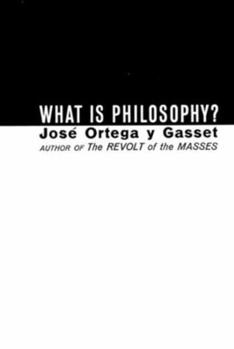What Is Philosophy?
Select Format
Select Condition 
Book Overview
A work powerful and pervading in its implications not only for metaphysics but also for art, political science, and the philosophy of history.
Format:Paperback
Language:English
ISBN:0393001261
ISBN13:9780393001266
Release Date:June 1964
Publisher:W. W. Norton & Company
Length:254 Pages
Weight:0.54 lbs.
Dimensions:0.6" x 5.0" x 8.0"
Customer Reviews
3 ratings
I dunno, what is it?
Published by Thriftbooks.com User , 19 years ago
With this masterwork of modern philosophy, Jose Ortega y Gasset bridges the gap between ancient Realism and Cartesian Idealism. Well, he doesn't bridge the gap so much as he offers a common thread between these two vital aspects of existence. To the ancients, everything they percieved in the world around them was "real". As we moved from the ancient, through the medieval, and into the modern period of philosophy, this singular, one-sided view of reality was considered to be naive at very best, initially by Rene Descartes, who is widely considered to be the father of modern philosophy. Descartes doubted everything, and so did Ortega. Descartes submitted that reality was existent solely within the mind of the "subject", the thinker. In other words, the object was part of the subject, and not two distinct facets of reality. This is where Ortega's critique of idealism kicks in. He doesn't just critique it, though, he offers a more logical extension of it. Furthermore, he doesn't discard the whole of idealism, just the latter part of it. The fact that our subjective, individual minds are necessary to reality is a fact that noone could deny, not even Ortega. Subjective though is the very genesis of reality. If one doubts the existence of a given object, the doubt DOES exist. If one denies doubt, then denial is still a form of though, still a very basic, primal funciton of the subjective mind. So with this, Ortega salvages the "useful" parts of Cartesian Idealism. He, on the other hand, discards the notion that the whole of reality is contained within the subjective mind. Ortega argues that ever subject must have a very distinct and separate object, and vice versa. They are totally and completely dependent on one another. Sure, some "figments" of what could possibly be an external reality existed in Idealism, but they were all just extensions of the mind. Ortega argues (and very well, I might add) that the two forms of reality, subjective mind and external objective world, do not simply exist, but very definitely coexist. So basically, what Ortega has done here is take us full circle, from ancient Realism, through Cartesian Idealism, and now we have the best of both worlds, we are able to experience the world fully through the window or "interface" known as our lives. We don't necessarily learn anything new, but we do learn what we already knew in profound and new ways. Now we know what we've always known before richer, deeper, and more completely than we ever have before.
Clear and straightforward
Published by Thriftbooks.com User , 23 years ago
In this book of essays, the great conservative philosopher from Spain exposes his theory of "vitalism". His main line of argument is that what really exists, what we truly are able to know it's there, is life. Not the I, not thought, nor matter, but life. Hence, the central problem of philosophy is the nature and essence of life: what it is, where it comes from, where it leads, how to cope with it. The whole idea is that philosophy should not be an eternal and circular reflection on abstract thoughts, but a well-ordered system of thought that enables us humans to live better, to understand better life and all that it is filled with. Caution: Ortega never argues in favor of a vulgar popularization or a cheapening of philosophy. He only tries to give the message that philosophy is for the living, for the common people (as individuals connected to community, but never as masses, cfr. "The revolt of the masses").Philosophy, then, must be connected to real experience. The philosopher must come out of the Ivory Tower, and experience life in the streets. Otherwise, philosophy will remain an abstruse and esoteric matter, only for those initiated, and that philosophy is not much useful. As with other thinkers, Ortega is overlooked for not being included in the Anglo-Saxon canon, but I think his work is one of the most alive and meaningful of all philosophy. It does have a message for people living at the beginning of the 21 century, and it would be worthwhile to read or re-read his, by the way, extremely clear and sraightforward voice. Ortega is not a Nietzsche musing upon disordered dreams of supermen (although he elaborates on this very philosopher). His is a well-thought, systematic and clear view of the world, and that makes it a very readable work.
under rated
Published by Thriftbooks.com User , 25 years ago
"What is Philosophy" presents a timeless question for philosophers intensely without intimidating the uninitiated. Ortega Y Gasset writes beautifully and clearly, touching on both Heideggar and Nietszche as well as a host of prominent European thinkers en route to a clearer understanding of the nature of philosphy and philosophizing. Newer students of philosophy should find this a wonderful supplement to the standard repetoire of a philosophy department Ortega Y Gasset is typically absent from





